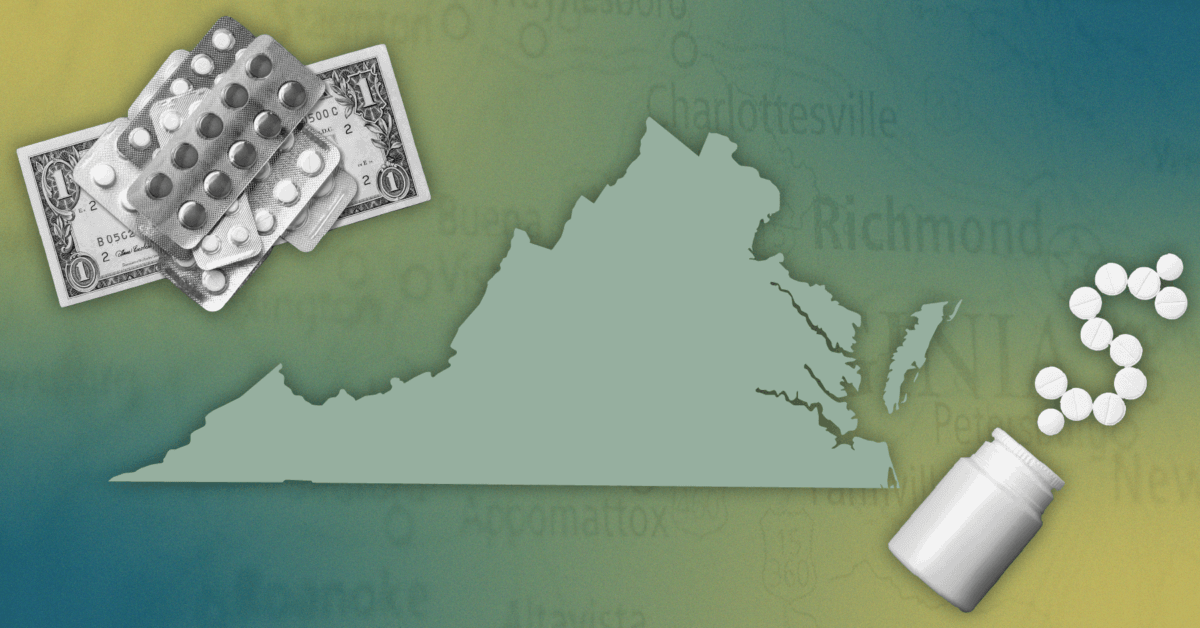
A bipartisan measure that would help Virginians save money on their prescription drugs was quietly killed in the Republican-controlled House of Delegates earlier this year. Here’s how it could be helping Virginians and how it might have another chance at becoming law next year.
The prices people pay for prescription drugs have soared in recent years, in many cases outstripping inflation rate increases and pushing families into economic precarity
But when Democratic lawmakers in the state Senate proposed a way to address this economic stressor earlier this year, they were met with stiff resistance from the pharmaceutical lobby and the Republican-controlled state House.
In January, a handful of Democrats in the state Senate proposed a bill establishing a Prescription Drug Affordability Board with the power to review and set upper payment limits on the prices of some drugs.
“Prescription drug costs have been spiraling out of control for years,” said Democratic Sen. Chap Petersen when the legislation was introduced.
The annual cost of prescription drugs rose on average 26% between 2015 and 2019, but average incomes in Virginia rose only about 17% in that same time period, according to a September 2022 report from Virginia’s Commonwealth Council on Aging.
While these costs force families to make tough financial decisions, big drug companies are thriving, experiencing massive profits in recent years.
“The model that we have for delivering medications is very tilted towards the suppliers, and it really extracts a lot of resources away from people that have very few resources,” Petersen said.
According to Petersen, Virginia spends roughly $2.4 billion annually on prescription drugs, with $2 billion going to spending through Medicaid and $400 million for drugs covered through the state employee health plan.
“We have a direct interest as a state government in controlling prescription drug costs,” he noted.
Most of his Senate colleagues agreed; the measure passed with bipartisan support, picking up five Republican votes in addition to full backing from the 40-seat chamber’s Democratic majority.
But the pharmaceutical and biotechnology industries, Virginia Manufacturers Association, and Virginia Chamber of Commerce pushed back against the legislation, arguing that the board could have a “chilling effect” on investment in the commonwealth’s drug research and development industry.
More importantly, however, the Republicans controlling the state House objected to the measure, ensuring its swift and quiet death via a “special subcommittee” stacked in favor of the GOP.
Democratic Sen. Creigh Deeds, a chief co-patron of the legislation, suspects that “industry” interests applied pressure to the Republicans on the House committee to which it was initially assigned. Because the bill failed, Virginians cannot expect meaningful relief from rising prescription drug costs in the coming year.
“This is precisely the sort of activity [the] government should conduct for citizens,” Deeds said. “There is a fine line between fair profit and fair pricing. This Board is simply a device that could look at the issue from the consumer’s point of view and ensure that excessive pricing does not deny people essential medications.”
But because 2023 is an election year in Virginia, Deeds does see a path to passing legislation creating this panel in the next legislative session; specifically, he believes the measure will succeed if voters elect “Democratic majorities in both the House and Senate.”
Democrats have a slim majority in the Senate, and Republicans have a two-seat edge in the 100-member House. A few hundred votes in just a handful of key districts could decide the balance of power in next year’s General Assembly – and whether or not Virginians can look forward to more reasonable prescription drug prices at some point in the future.

VIDEO: Your support matters!
Your support matters! Donate today. @vadogwoodnews Your support matters! Visit our link in bio to donate today. #virginianews #virginia #community...

Op-Ed: Virginia’s new Democratic majorities pass key bills to improve your lives, but will Youngkin sign them?
The 2024 Virginia General Assembly regular session has wrapped up. It was a peculiar session from the outset, with Democratic majorities in the...

Op-Ed: Why Virginia Needs A Constitutional Amendment Protecting Reproductive Freedom
Virginia’s recent election season in 2023 drew in eyes from all over the country. Reproductive freedom was on the line and Virginia remained the...

From the state rock to the state flower, here’s how Virginia got its symbols
Have you ever wondered why the Dogwood is the state flower? Or how the cardinal became the state bird? We’re here to answer those questions and more...

VIDEO: Second-gentleman Douglas Emhoff gives speech on reproductive freedom
Second gentleman, Douglas Emhoff touched on reproductive freedom not only being a woman's issue but "an everyone's issue" during the Biden-Harris...

Glenn Youngkin and the terrible, horrible, no good, very bad night
Election Day 2023 has come and gone, and while there are votes to be counted, one thing is perfectly clear: Virginians unequivocally rejected Gov....





